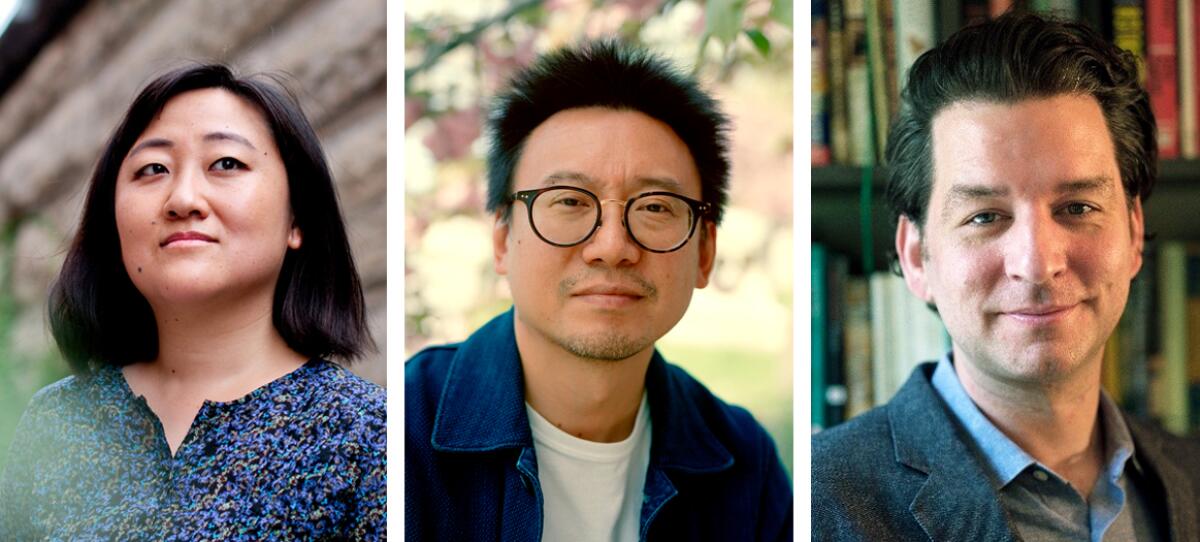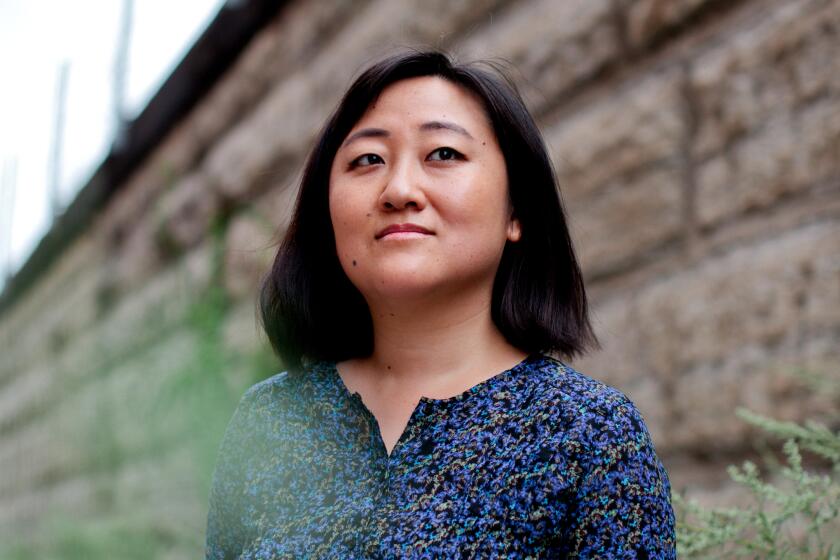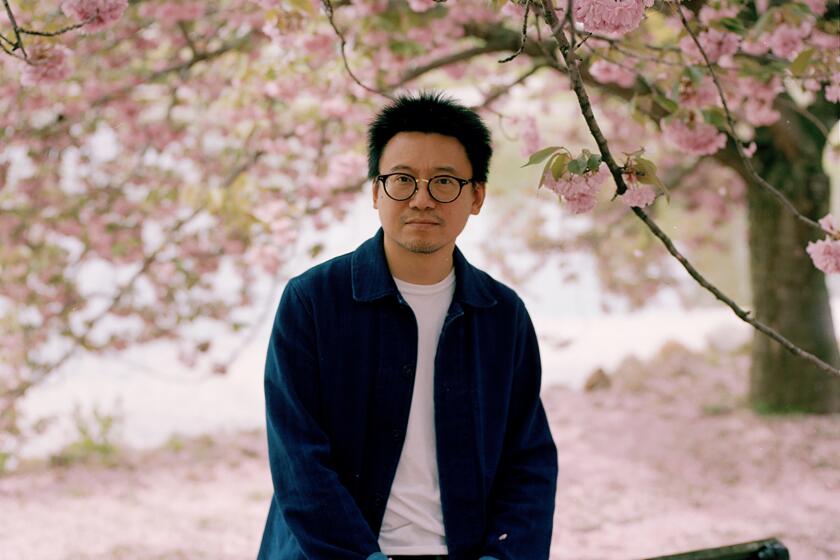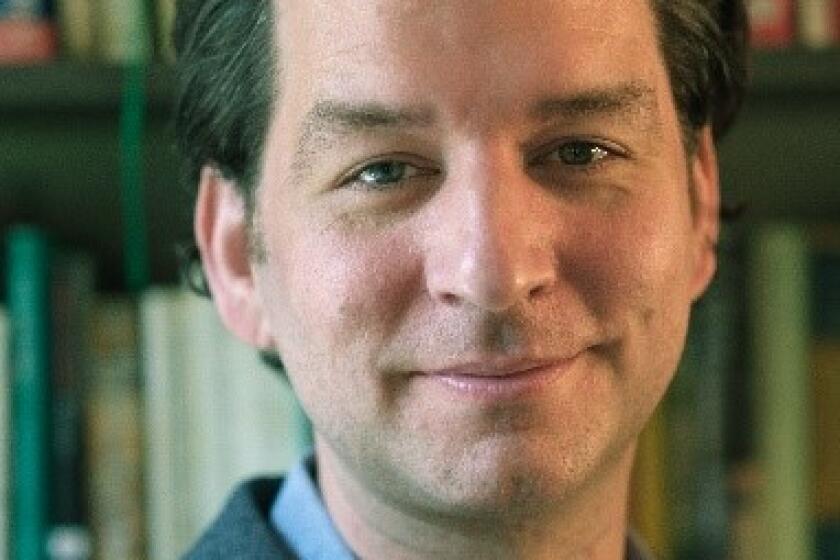Ling Ma, Isaac Butler and Morgan Talty among National Book Critics Circle Award winners

- Share via
Ling Ma, Morgan Talty, Boris Dralyuk and Isaac Butler are among the winners of the 2022 National Book Critics Circle Awards announced during a ceremony Thursday night at the New School in New York City.
Ma earned the prize in fiction for “Bliss Montage: Stories,” her debut story collection, filled with offbeat stories that nod to her knack for surrealism: a woman living with all of her ex-boyfriends; friends popping pills that make them invisible; a yeti who seduces a woman to the smooth soundtrack of Janet Jackson.
“Ma rides a good concept when she finds one,” Hillary Kelly wrote in a Times review of “Bliss Montage,” a followup to “Severance,” her acclaimed dystopian debut novel. She “pulls at the flesh of this juicy morsel until it is so distorted that it can no longer safely hold the seed at its center,” Kelly added.
Ling Ma, whose debut novel, “Severance,” was acclaimed for its wild premise and execution, unspools more meaningful dark fantasies in “Bliss Montage.”
Talty won the John Leonard Prize, awarded to a debut book in any category, for his short story collection, “Night of the Living Rez.” The linked stories illuminate a harsh reality of life for a young Native American living in the Panawahpskek (Penobscot) Nation of Maine. Talty compassionately explores family and inheritance, poverty, mental illness and drug addiction through a contemporary lens.
Butler received the nonfiction award for “The Method: How the Twentieth Century Learned to Act,” a work that chronicles the history of the influential Method approach to acting as if it were a biography of a concept, beginning with its origin at the turn of the 20th century.
In a Times review, Sheana Ochoa called it “engaging and meticulously researched,” adding that, “Like a good 19th century omniscient novelist, Butler hops seamlessly among his characters’ points of view while recounting their lives and times ... gracefully balancing on the right side of that fine line between contextualizing and condescending to the reader.”
Hua Hsu took home the autobiography award for “Stay True: A Memoir,” a coming-of-age story that dives deep into the friendship between two Asian American college students as they navigate American culture and build a bond from shared cigarettes and deep conversation. The book explores meaning, belonging and grief.
Hua Hsu found his best friend at UC Berkeley -- and lost him soon after. He talks about “Stay True,” his new paean to friendship, music and identity.
Beverly Gage won in the biography category for “G-Man: J. Edgar Hoover and the Making of the American Century,” which drew from never-before-seen sources to create a full portrait of Hoover’s life and career, placing him at the center of American political history to explore the evolution of governance, political culture and power.
“G-Man: J. Edgar Hoover and the Making of the American Century” was also a finalist for the 43rd Los Angeles Times Book Prize in biography.
A new award this year, the Gregg Barrios Book in Translation Prize, was shared by Ukrainian author Andrey Kurkov and translator Boris Dralyuk for the novel “Grey Bees.” Dralyuk resigned this year as editor of the Los Angeles Review of Books. His wife, Jennifer Croft, was also a finalist for the prize — the first time members of a couple have both been nominated for the same NBCC honor.
The award for criticism went to Timothy Bewes for “Free Indirect: The Novel in a Postfictional Age.” The NBCC’s Jennie Hann wrote, “The genius of ‘Free Indirect’ inheres in the fact that, even while Bewes illustrates the limitations of traditional approaches to the study of the novel, he somehow finds a way to transcend them. The result is a densely-packed volume that erupts with insight on every page.”
The poetry winner was Cynthia Cruz for “Hotel Oblivion,” described by Four Way Books as chronicling “the subject’s repeated attempts at locating an exit from capitalist society via acts of negative freedom and through engagement with the death drive, whose aim is complete destruction in order to begin all over again.”
Isaac Butler’s new history, “The Method: How the Twentieth Century Learned to Act,” documents the revolution in acting that still permates Hollywood.
Joy Harjo received the Ivan Sandrof Lifetime Achievement Award. “I accept this honor for a lifetime of mischief,” Harjo said in her acceptance speech. “I mean writing, of course; the best writing makes for a kind of mischief. That is, it runs counter to the expected, opens doors of fresh insight that upset the status quo, makes a pathway for justice to have its say.”
Prize committee chair Jacob M. Appel said the award honors “individuals whose own literary works have transformed book culture and also those whose activism and service on behalf of other writers has proven to be of remarkable influence. As a three-term United States Poet Laureate and a leading voice for Native American communities on and off the pages, Harjo embodies both of these legacies. ... She stands not only as a literary envoy for indigenous peoples everywhere, but also as the unrivaled ambassador of American poetry.”
The winner of the Toni Morrison Achievement Award, established by the NBCC in 2021 to honor institutions that have made lasting and meaningful contributions to book culture, was the San Francisco-based bookstore and independent publisher City Lights.
“The impact of City Lights on American literature has been revolutionary,” said Appel, “which may be the highest compliment one can bestow upon an enterprise whose goal since its inception has been to transform both the realm of literature and society beyond. Since its founding in the early 1950s by Peter D. Martin and Lawrence Ferlinghetti ... City Lights has introduced American audiences to audacious new voices, inviting us to lunch with Frank O’Hara, wander with Marie Ponsot, and howl with Allen Ginsberg. Far more than a press or a bookshop, City Lights shines as a beacon for innovation and justice and as a guiding flare for readers and writers across the globe who dream of a better world.”
The full list of finalists:
Autobiography
Jazmina Barrera, “Linea Nigra: An Essay on Pregnancy and Earthquakes” (translation by Christina McSweeney)
Hua Hsu, “Stay True: A Memoir”
Dorthe Nors, “A Line in the World: A Year on the North Sea Coast” (translation by Caroline Waight)
Darryl Pinckney, “Come Back in September: A Literary Education on West Sixty-seventh Street, Manhattan”
Ingrid Rojas Contreras, “The Man Who Could Move Clouds: A Memoir”
Biography
Kerri K. Greenidge, “The Grimkes: The Legacy of Slavery in an American Family”
Jennifer Homans, “Mr. B: George Balanchine’s 20th Century”
Beverly Gage, “G-Man: J. Edgar Hoover and the Making of the American Century”
Clare Mac Cumhaill and Rachael Wiseman, “Metaphysical Animals: How Four Women Brought Philosophy Back to Life”
Aaron Sachs, “Up From the Depths: Herman Melville, Louis Mumford, and Rediscovery in Dark Times”
Criticism
Rachel Aviv, “Strangers to Ourselves: Unsettled Minds and the Stories That Make Us”
Timothy Bewes, “Free Indirect: The Novel in a Postfictional Age”
Peter Brooks, “Seduced by Story: The Use and Abuse of Narrative”
Margo Jefferson, “Constructing a Nervous System: A Memoir”
Alia Trabucco Zerán, “When Women Kill: Four Crimes Retold” (translation by Sophie Hughes)
Fiction
Percival Everett, “Dr. No”
Jon Fosse, “A New Name: Septology VI-VII, trans. by Damion Searls”
Mieko Kawakami, “All the Lovers in the Night, trans. by Sam Bett and David Boyd”
Ling Ma, “Bliss Montage: Stories”
Namwali Serpell, “The Furrows”
Nonfiction
Kelly Lytle Hernandez, “Bad Mexicans: Race, Empire, and Revolution in the Borderlands”
Joseph Osmundson, “Virology: Essays for the Living, the Dead, and the Small Things in Between”
Isaac Butler, “The Method: How the Twentieth Century Learned to Act”
Annie Proulx, “Fen, Bog, & Swamp: A Short History of Peatland Destruction and Its Role in the Climate Crisis”
Ed Yong, “An Immense World: How Animal Senses Reveal the Hidden Realms Around Us”
Poetry
Mosab Abu Toha, “Things You May Find Hidden in My Ear”
Cynthia Cruz, “Hotel Oblivion”
David Hernandez, “Hello I Must Be Going”
Paul Hlava Ceballos, “banana [ ]”
Bernadette Mayer, “Milkweed Smithereens”
Gregg Barrios Book in Translation Prize
Jennifer Croft’s translation of “The Books of Jacob” by Olga Tokarczuk
Fady Joudah’s translation of “You Can Be the Last Leaf” by Maya Abu Al-Hayyat
Boris Dralyuk’s translation of “Grey Bees” by Andrey Kurkov
Mara Faye Lethem’s translation of “When I Sing, Mountains Dance” by Irene Solà
Christina MacSweeney’s translation of “Linea Nigra” by Jazmina Barrera
Mark Polizzotti’s translation of “Kibogo” by Scholastique Mukasonga
John Leonard Prize
Jessamine Chan, “The School for Good Mothers”
Jonathan Escoffery, “If I Survive You”
Tess Gunty, “The Rabbit Hutch”
Zain Khalid, “Brother Alive”
Maud Newton, “Ancestor Trouble: A Reckoning and a Reconciliation”
Morgan Talty, “Night of the Living Rez”
Vauhini Vara, “The Immortal King Rao”
More to Read
The biggest entertainment stories
Get our big stories about Hollywood, film, television, music, arts, culture and more right in your inbox as soon as they publish.
You may occasionally receive promotional content from the Los Angeles Times.














